Tourism Technology Transformation Cube (Tcube)

About Tcube
Tcube, or the Tourism Technology Transformation Cube, is an innovation platform and initiative by the Singapore Tourism Board (STB) that provides thought-leadership resources, digital initiatives, and programmes to support the tourism sector's digital transformation journey. Through Tcube, STB aims to groom transformational leaders, cultivate a community of innovators, and facilitate partnerships between like-minded stakeholders to drive transformation within the sector for the future.
Find out more about the programmes here .
About the Singapore Tourism Board
Singapore Tourism Board (STB) is the lead development agency for tourism, one of Singapore’s key economic sectors. Together with industry partners and the community, we shape a dynamic Singapore tourism landscape. We bring the Passion Made Possible brand to life by differentiating Singapore as a vibrant destination that inspires people to share and deepen their passions.
Sign up for the latest innovation updates
Customise your preferences to receive updates in industries you're interested in.
- Big Data & Analytics
- Data Centre
- Regulation & Compliance
- Customer Experience
- Smart Cities
- Workplace Evolution
- AI & ML
- Augmented & Virtual Reality
- Internet of Things
- Quantum Computing
- Robotics & Automation
- Supercomputing & HPC
- Infographics
- Whitepapers

- Digital Transformation

Singapore Tourism Board’s digitalisation drive
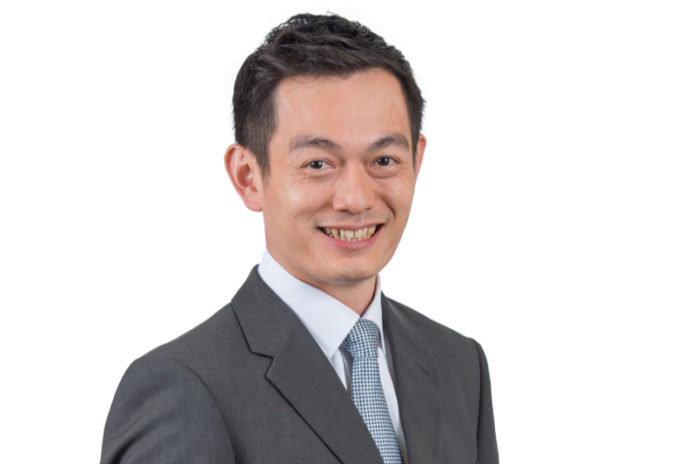
The Singapore Tourism Board (STB) is the leading economic development agency for Singapore’s tourism industry. Seeking to differentiate Singapore as a tourism destination, STB oversees all aspects of tourism in the city-state, including resource allocation and strategic planning.
STB Chief Technology Officer Wong Ming Fai has spent the last several months formulating and aligning technology and digitalisation strategies to promote the country’s tourism industry. One of his latest initiatives is the Tourism Information & Services Hub (TIH), an online portal that gathers information on Singapore’s tourism offerings.
Frontier Enterprise recently talked to Wong about the technology behind TIH, how it helps tourism businesses impacted by the pandemic, STB’s planned technology deployments, and much more.
Could you share a bit about the launch of STB’s TIH digital resource platform? What kind of technologies were used in building it? Was it outsourced or created internally?
TIH is a digital resource platform developed by STB for tourism businesses to access relevant information on Singapore’s tourism offerings and travel software services.
TIH was developed using the Agile software development methodology where the team was able to test the product, and respond to market feedback throughout the development period. It took 10 months to complete, from conceptualisation to its beta release.
This platform gives businesses access to a repository that contains over 4,000 listings and more than 13,000 media assets across 12 categories; as well as plug-and-play services like enhanced navigation and an itinerary planner. Real-time information updates are pushed to all TIH-linked tourism-related websites and mobile applications through the use of application programming interfaces (APIs).
TIH was developed based on the RESTful API, where APIs are broken down into multiple independent microservice components. Currently, TIH has more than 150 APIs and uses digital products for its:
- API gateway, which aggregates all API services within a unified user interface.
- Content management and analytics, which enables STB to reach and engage users across the Web and mobile devices. This includes real-time web and mobile analytics, which gives STB insights into customer behaviour.
- Hosting platform, which allows STB to leverage security by monitoring infrastructure services.
TIH has also developed services that rely on artificial intelligence (AI) capabilities such as a recommendation engine and itinerary planner. The recommendation engine provides travellers activity suggestions, based on data such as nationality, location, and profile. The itinerary planner generates customised travel plans based on travellers’ preferences and length of stay.
What were some of the technological challenges that you faced when deploying TIH, especially when integrating it with STB’s legacy systems?
When the idea for TIH was first mooted, there was no precedent for a destination content and services platform of its scope and scale. The two key challenges we faced were:
- Establishing a singular standard across Singapore’s destination content. There is a huge breadth of content categories covering our various tourism industries. The team had to examine a wide pool of content to propose a standardised structure on how information such as business addresses, opening hours, images, and videos could be easily and consistently used and displayed by tourism-related websites and mobile applications.
- Migration of legacy assets, which did not align with the standardised usage rights. TIH aims to be a platform for businesses to directly connect, access, and share Singapore tourism information and travel software services. STB had, in the past, maintained a repository of images and videos with varying usage rights (e.g. limited geographical use, rights-managed). Time and effort was spent identifying assets that were aligned to TIH usage rights, as well as setting up a process for a seamless transition between the two systems to minimise disruption to our users.
In addition to exposure, how can listing a company’s details in TIH help local tourism businesses affected by the COVID-19 pandemic stay afloat?
With TIH, tourism players can achieve greater exposure for their products and amplify their marketing efforts to reach more channels and broaden their consumer base. They will also be able to connect with other tourism businesses to explore collaborations and partnerships. Some examples on how TIH can help specific tourism players include the following:
- Attraction operators can share more highlights (such as latest events, images, and show timings) for business partners to use and share to a wider audience.
- Travel agents and tourist guides can extend the reach and exposure of their tours as a key content component on TIH.
- Hotels can contribute key information (latest offers, services, and food & beverage events) to enhance awareness of their offerings.
- App developers can use over 150 APIs on Singapore-related content and travel software services like the recommendation engine.
In support of COVID-19 recovery efforts, STB added a content category for deals on TIH to enable tourism businesses to actively contribute and cross-share deals. Attractions, tour operators, tourist guides, and hotels are encouraged to offer their deals and promotions through TIH to expand their reach.
Are you looking forward to deploying any new technologies for the STB to use in the near future? For example, do you plan to use AI, big data, facial recognition, or augmented reality (AR) in some capacity? If so, please tell us more about them.
We know future travellers will prioritise health and safety above all else, and so we need to use technology to build confidence in Singapore as a safe destination. In addition, with online shopping and virtual meetings becoming the norm, consumers are more accustomed to using technology to experience their world. As such, they have raised their expectations of how tourism companies are deploying technology.
Through the Singapore Tourism Accelerator programme, we are working to identify gaps in the travel and tourism industry, and match them with startups or pre-scaleups that can help develop solutions to future-proof the industry. The objective is to help tourism companies thrive amidst the challenges brought about by COVID-19.
These solutions include AI, data analytics, facial recognition, and AR. To date, the Accelerator has supported 25 start-ups to develop 35 industry solutions across the first three cohorts, which include contactless transactions, enhancing the visitor experience with digital tools, real-time monitoring of tourism establishments to improve crowd management, and technology to raise cleanliness and hygiene standards. For example:
- As part of their digital transformation, Copthorne King’s Hotels (Millennium Hotels and Resorts) has partnered with WooHoo to bring an in-room voice assistant. Guests can issue voice commands to make phone calls, play in-room entertainment (e.g. music, TV), request for toiletries, place in-room dining orders, and adjust the lighting. The aim is to reduce staff calls by 20%, increase in-room dining by at least 30%, and provide real-time operational insights.
- Snow City Singapore is piloting a facial recognition ticketing system with local company Facepaz to facilitate contactless ticketing to save time and avoid crowding at ticketing counters.
- The Ritz-Carlton, Millenia Singapore developed an AR art tour for hotel guests, in collaboration with PlattAR, an AR company based in Australia. Likewise, Marina Bay Sands worked with BuzzAR on the development of an AR-driven wayfinding solution that helps visitors within the resort and drive foot traffic to brick-and-mortar retail outlets.
In 2020, we also launched a new AR strategy to seed industry-wide capabilities in a growth area that remains under-appreciated in our sector. We are developing a library of up to 1,000 3D assets over the next three to four years to supplement the current lack of such content in the market, and will make these assets available via TIH without additional charge.
To support the development and deployment of new technologies in the tourism sector, we also launched Tcube, a hybrid innovation space that brings STB’s digital initiatives, resources and content onto a single platform to support our sector’s digital transformation.
You’ve been focusing on digitalisation these past few years. Could you highlight some of the other technology-enabled transformations STB has undergone?
Like most organisations, STB officers have had to adjust to working from home during this period by conducting virtual meetings and work events. Even prior to the pandemic, technology has been second nature to our work – be it leveraging data analytics from the Singapore Tourism Analytics Network (Stan), or using digital platforms and content to engage potential visitors. STB officers are also being trained in Agile and Scrum practices.
Officers are encouraged to keep up-to-date with tech developments and best practices in the marketplace. To that end, we developed the Tech College, a series of technology programmes, talks, and workshops organised by STB. These are open to industry stakeholders and our own officers.
We are also actively developing AI solutions and piloting these with tech companies to make AI ubiquitous and accessible within STB. For example, we are using machine learning techniques (such as neural networks) to improve the way we analyse our data at scale to help inform our strategies. Staff can then access such information and insights through Stan. We are also using AI to improve our operational efficiencies by analysing the feedback from our visitors.
RELATED ARTICLES MORE FROM AUTHOR

GPUS are powering AI’s next wave in APAC

Confluent’s blueprint: From data chaos to clarity

Co-creation is key to design maturity, not just adoption
Lenovo articles.

Lenovo Launches New Hybrid Cloud Platforms and Services to Accelerate AI

Lenovo’s New All-in-One, AI-Powered Solution with Microsoft Simplifies Security and Removes...

Lenovo unleashes next-generation edge AI solutions for intelligent transformation

Beyond the grandstand: How Lenovo Technology takes Formula 1 fans on...

Lenovo Whitepapers

Is your organisation ready for a subscription- based world?

Lenovo TruScale for Hosted Desktops with Nutanix

Swiftly transform your data centre with Lenovo ThinkAgile HX series

Smarter Data Management Playbook 2023
Lenovo podcasts.

► Data Centre and High-Performance Computing: An AMD Perspective

► Formula One Racing and High Performance Computing – Exploring the...
- Sustainability
- Latest News
- News Reports
- Documentaries & Shows
- TV Schedule
- CNA938 Live
- Radio Schedule
- Singapore Parliament
- Mental Health
- Interactives
- Entertainment
- Style & Beauty
- Experiences
- Remarkable Living
- Send us a news tip
- Events & Partnerships
- Business Blueprint
- Health Matters
- The Asian Traveller
Trending Topics
Follow our news, recent searches, shifts in technology, sustainability present opportunities for tourism sector in the long run: chan chun sing, advertisement.

Tang See Kit
SINGAPORE: From the transformation of an annual food festival into a virtual affair with live classes to the gamification of a walking tour where participants solve puzzles while exploring Chinatown, these are some examples of how tourism players have been reinventing their businesses with technology amid COVID-19.
Digitalisation and new technologies were already “disrupting” the tourism sector before COVID-19, and the pandemic has accelerated the shift in how people and businesses connect with one another, said Minister for Trade and Industry Chan Chun Sing on Wednesday (Apr 7).
“In a world where visitors are not constrained by physical boundaries, travel is no longer just about meetings or sightseeing but the unique suite of experiences that it offers to visitors, from pre-arrival to post-departure,” he said at the Singapore Tourism Board’s (STB) annual industry conference.
“The next bound of growth for the tourism sector will come from creating quality end-to-end experiences, curated to the needs of travellers.”
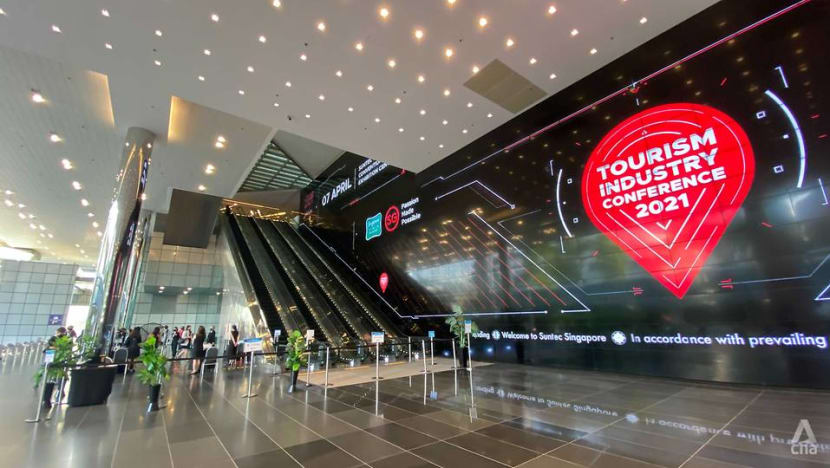
READ: Live masterclasses, virtual food tours and more at this year’s Singapore Food Festival
Singapore will have to continue leveraging technology to reinvent the experiences it offers to travellers, said the minister, as he announced the launch of a new platform called the Tourism Technology Transformation Cube (Tcube) that will serve as the “go-to resource” for tourism businesses during their digital transformation journeys.
“The initiatives under Tcube will enable tourism businesses to meet like-minded tourism stakeholders to facilitate knowledge exchange, test innovative ideas through proofs-of-concept and pilots and equip themselves with the tools to build and scale sustainable business models,” he said.
STB’s chief executive Keith Tan said the board will extend its Tourism Accelerator programme for another two years until September 2023.
The programme was first rolled out in 2019 to help tourism businesses source innovative solutions to address challenges. To date, it has supported 25 start-ups to develop 35 industry solutions.
Mr Tan said the tourism board will continue to work with partner agencies to attract companies with technology and digital solutions that are relevant for Singapore’s tourism sector.
READ: Museum of Ice Cream among 3 tourist attractions opening in Singapore
“We need you to provide the demand to test these solutions, to run pilots and see if they can be scaled up quickly,” he said at the conference.
“If we don’t do this, we will run the risk of becoming outdated, unable to keep up with the demands and expectations of discerning quality visitors."
A new Tourism Sector Capability Development Roadmap will also be developed by STB and the National Trades Union Congress (NTUC) to ensure the tourism workforce is equipped with the skills needed in a post-pandemic world.
With support from the industry-led alliance under the Emerging Stronger Taskforce, the roadmap is expected to be finalised and shared later this year, said Mr Tan.
BECOMING A SUSTAINABLE DESTINATION
The tourism sector will also have to capture opportunities in the shift towards sustainability, said Mr Chan.
The minister pointed to the recently announced Singapore Green Plan 2030, which aims to develop Singapore into a sustainable and innovative urban destination.
READ: Singapore unveils Green Plan 2030, outlines green targets for next 10 years
While Singapore might not be able to compete with other “eco-destinations” given its land scarcity and lack of natural landscapes, the country’s value proposition comes from “the intangibles”, he said.
These include a progressive and transparent regulatory environment, strong protection of intellectual property, as well as a vibrant public and private ecosystem.
“We want to be the best place to test bed sustainable solutions, new products and new experiences, enabling businesses from around the world to launch first-to-market solutions and innovations, right here in Singapore,” said Mr Chan.
Mr Tan said that while many industry players recognise the need to focus on environmental sustainability, the issue must be tackled “collectively as a destination, rather than enterprise by enterprise”.
As such, STB will approach industry players over the coming months to share its thoughts on developing strategies and a roadmap for destination sustainability.
It will also broaden the scope of the Singapore Tourism Accelerator to include developing solutions for sustainability.
“Ultimately, we don’t just want to be known as a sustainable destination, but as a great location for companies to test bed sustainable tourism solutions,” said Mr Tan, citing examples such as a net zero-carbon hotel or entertainment event.
READ: About three-quarters of adult Singaporeans have not used their SingapoRediscovers vouchers
BUSINESS TRAVEL WILL SEE DEMAND
Other trends that the industry must wrestle with in the post-pandemic future include what Mr Tan described as “remote nearly everything”, which is the acceleration of remote working and virtual events.
STB believes there will still be demand for business travel, even with the emergence of convenient tools for virtual meetings, he said.
“It’s one thing to travel around the world to listen to presentations that you could have listened to from home via Zoom, but it’s another thing to travel to an event to exchange ideas and knowledge that can in turn produce new ideas, products, and knowledge. Or, to experience, touch, and taste new products and innovations that can disrupt or revolutionise your business,” he added.
“So, the challenge for us is to ensure that Singapore continues to offer these sorts of value-adding, world-leading, knowledge-building events and activities here.”
He suggested holding conferences and trade shows that focus on major problems that require urgent attention from corporates and governments, such as food security.
A “strong” meetings, incentives, conventions and exhibitions (MICE) industry will also be needed, Mr Tan added.
Apart from partnering the Singapore Association of Convention and Exhibition Organisers and Suppliers (SACEOS), STB will do its part to support and profile the industry.
READ: Safety guidelines, tips on hybrid model part of new resilience roadmap for MICE and events sector
One of its plans is to set up two offices in Brussels and San Francisco this year, announced Mr Tan, adding that it will also allow them to “engage a larger base of international organisations and companies, and key decision makers so that we can secure more high quality business events for Singapore”.
Other announcements made at the annual tourism industry conference include three upcoming tourist attractions in Singapore, as the country looks to rejuvenate its battered tourism sector following a “long winter” brought about by the pandemic.
These new projects will help to support the tourism sector and increase its attractiveness, said Mr Tan.
“Since the pandemic hit, we have focused on weathering this long winter but now, it is time for us to start thinking about the future – what do we need to do today, so that we can thrive and succeed tomorrow?” he added.
Related Topics
Also worth reading, this browser is no longer supported.
We know it's a hassle to switch browsers but we want your experience with CNA to be fast, secure and the best it can possibly be.
To continue, upgrade to a supported browser or, for the finest experience, download the mobile app.
Upgraded but still having issues? Contact us

Opening Address by MOS Low Yen Ling at Tourism Transformation 2022
Mr Yeo Li Pheow, Principal and CEO, Republic Polytechnic,
Mr Mike Barclay, Group CEO, Mandai Wildlife Group,
Industry Partners,
Distinguished Guests,
Ladies and Gentlemen,
Students from the five Polytechnics and ITE,
1. Good afternoon. Thank you for inviting me to join you here again at ‘T ourism Transformation ’, the 4 th edition of the joint Poly-ITE career fair.
2. As the name of the event suggests, much has changed and evolved over the last two years. In 2019, it was held physically in Temasek Polytechnic, where career booths were set up and groups of students participated in the ‘ Ideathon ’ case competition. Today, we have adapted and embraced a hybrid style of communication and engagement as we meet via a Zoom conference.
COVID-19 and the Significance of Tourism Sector
3. The COVID-19 pandemic has upended the tourism industry in many countries across the globe. In Singapore, while Safe Management Measures and border restrictions were vital in limiting the spread of COVID-19 and ensuring public safety, they have weighed on the tourism sector.
4. The importance of tourism goes beyond offering quality leisure options – it boosts and reinforces Singapore’s status as a global hub and serves as a conduit for businesses, capital, and talent.
5. The Government has set our path towards a new normal, including the opening our borders safely and progressively. Thankfully, our high vaccination rates, the steady rollout of the booster shots, and other existing measures have supported and will continue to support the easing of domestic and travel restrictions.
Key Trends in the Tourism Sector
6. Let me share three key trends that have impacted the tourism sector.
7. First, we expect tourism recovery to be gradual and it may take a few years before international visitor arrivals and tourism receipts return to pre-COVID levels. In the meantime, Singapore adopts a calibrated approach in easing travel restrictions. The launch of the Vaccinated Travel Lanes (VTLs) last year was a significant first step towards reviving international travel and is a stepping stone for wider travel reopening. As the global situation remains uncertain with the emergence of the Omicron variant, we will continue to closely monitor and review our border measures regularly.
8. Second, we have seen how COVID-19 has accelerated the rise of the digital economy and transformed the way businesses and individuals connect with one another. It is essential for the industry to keep on leveraging technology and building new capabilities to offer safe, seamless, and novel travel experiences that enhance Singapore’s attractiveness as a tourism destination.
9. Third, the rise of environmental sustainability will continue to grow and offer fresh opportunities. Increasingly, businesses and individual travellers are looking forward to sustainable experiences. Beyond developing personalised tourism experiences and introducing new and refreshed attractions, businesses must consider how they may incorporate sustainability in their offerings.
10. With an eye on these trends, let me share how Singapore is reshaping and energising its tourism landscape.
Reshaping Singapore’s Tourism Landscape
Embrace Digital Transformation
11. Today, we have adopted innovations such as contactless technology, cleaning robots, and the TraceTogether app and token to enhance productivity and public cleanliness and safety. We have also recreated new experiences and conceived innovative possibilities with the use of technology and digital tools. Recognising that digital transformation is the way forward, the Singapore Tourism Board (STB) introduced initiatives such as Tcube, a hybrid innovation space that brings digital initiatives, resources, and thought leadership content onto a single platform. In addition, we have the Tourism Accelerator Programme that supports companies in developing and piloting quality solutions with industry players. The NTUC, together with trade associations and chambers, has also launched the Tourism Sector Capability Development Roadmap to support businesses in their development of digital offerings and the upskilling of their workers to be future-ready.
Sustainable Tourism Destination
12. In line with the Singapore Green Plan 2030 announced by the Government last year, our vision is to be a City in Nature, where large experiences come with small footprints. This includes efforts to achieve carbon neutrality and the introduction of sustainable tourism offerings. Sentosa Development Corporation, which most of you should be familiar with, had launched its sustainability roadmap to double up efforts in transforming the island into a sustainable tourist destination. STB has also joined the Global Sustainable Tourism Council in October last year to contribute to efforts that advance sustainability in the global travel and tourism industry. With limited land resources, Singapore will do well by strengthening our position as a hub to draw partnerships and innovations to sharpen our competitive edge with sustainability.
Roles and Values of Tourism and Hospitality Graduates
13. As we reinforce Singapore’s value proposition as a sustainable and innovative tourist destination, students like you have a big role to play, when you graduate or even now, during your internships.
14. Today, the tourism and hospitality courses offered by the Polytechnics and ITEs aim to better equip our students with the relevant skills and expertise needed in the market. Through industry placements and immersion programmes, you will gain valuable industry exposure and insights that will equip you for your future career in the tourism sector.
15. In addition to Mr Yeo’s earlier sharing, the schools have also introduced new course modules that pivot towards digital and hybrid hospitality management as well as sustainability. You will have the opportunity to immerse yourselves in augmented and virtual reality, and at the same time, be familiar with a wide variety of green efforts that aim to reduce carbon footprint. These are the key domains which we will observe significant developments in the near future.
16. As Gen Z and digital natives, I am confident you will contribute to our next phase of digital transformation as we continue to evolve our tourism strategies for the future. We look forward to your youthful energy and passion to fuel creative offerings and innovative skills in this important sector of Singapore’s economy.
17. I would like to take this opportunity to thank the tourism sector co-ordination team and industry partners for your continued support of the Tourism Transformation career fair.
18. To all our students, I hope you will embark on your career in tourism with a great head-start. May you take home valuable lessons from the breakout sessions later where industry experts and leaders will share their rich anecdotes and enlightening experiences.
19. I wish everyone all the best in your endeavours and a very Happy Lunar New Year.
20. Thank you.
Speech by MOS Alvin Tan at the Electronics Industry Day
- People at MTI
- Free Trade Agreements
- International Investment Agreements
- Digital Economy Agreements
- Green Economy Agreements
- Multilateral & Regional Forums
- Indo-Pacific Economic Framework for Prosperity (IPEF)
- For Individuals
- Submit a Pro-Enterprise Suggestion
- Submit a First Mover Idea
- Apply for Business Grant
- Apply for Business License
- Singapore's National Hydrogen Strategy
- France-Singapore Digital and Green Partnership
- US-Singapore Partnership for Growth and Innovation
- Press Releases
- Parliamentary Replies
- Forum Letter Replies
- Public Consultations
- Key Economic Indicators
- Economic Survey of Singapore
- Feature Articles
- Publications
- Legislation

Sorry, we couldn't find any matches for 'innnnn'
Try the following:
- Double check your spelling for typos
- Search again using more general terms
- Try popular keywords
- Explore by category
Be aware of scammers impersonating as IMDA officers and report any suspicious calls to the police. Please note that IMDA officers will never call you nor request for your personal information. For scam-related advice, please call the Anti-Scam helpline at 1800-722-6688 or go to www.scamalert.sg .

- How We Can Help
- SMEs Go Digital
- Industry Digital Plans
- Industry Digital Plan – Tourism (Attractions) IDP
Tourism (Attractions) Industry Digital Plan
About the tourism (attractions) industry digital plan (idp).
The new Tourism (Attractions) Industry Digital Plan (IDP) supports Singapore attractions companies through their digitalisation journey by providing step-by-step guidance on the selection of digital solutions to adopt at each stage of growth across three key job functions in the industry, namely customer service and engagement, sales and marketing, and sustainability. The IDP includes advice on how Singapore attractions companies can overcome challenges in the industry as they pursue digital transformation to enhance processes and improve operational efficiencies to deliver better customer experience.
The Tourism (Attractions) IDP was jointly developed by Infocomm Media Develop Authority (IMDA) and the Singapore Tourism Board (STB). For more information, please read the media factsheet on the launch of the Tourism (Attractions) IDP.
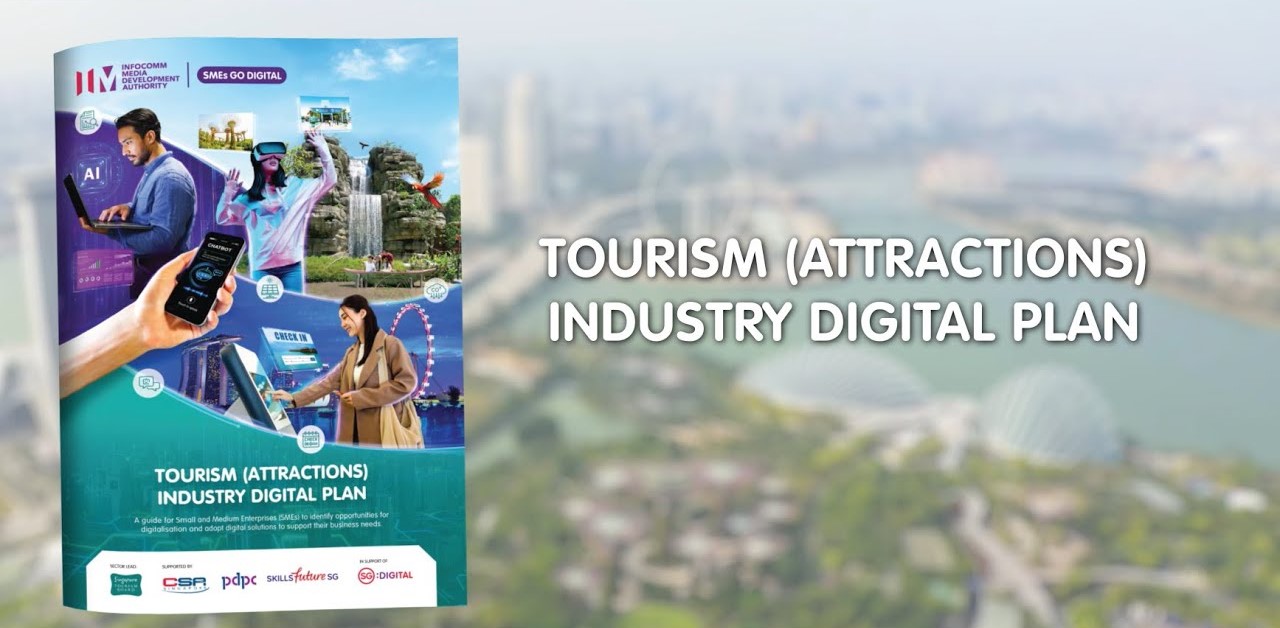
Find out how digital technology benefits the tourism industry.
Grant support for digitalisation journey
The Tourism (Attractions) IDP outlines the digital solutions that companies can adopt at each stage of their growth to streamline operations, improve efficiency, and drive business growth.
Eligible companies can receive funding support from the Productivity Solutions Grant (PSG) or other relevant grants on the Business Grants Portal to implement digital solutions in the Tourism (Attractions) IDP.
Easy access to digital consultancy services
IMDA's Chief Technology Officer-as-a-Service provides free digital consultancy and project management services to eligible SMEs. Assess your digital readiness and receive digital solutions recommendations that best meet your business needs.
Send us your feedback on the IDPs by filling up this form (270.75KB) (best viewed in Microsoft Word) and emailing us at [email protected] .

Level up your business with the Tourism (Attractions) Industry Digital Plan
Learn how the Tourism (Attractions) Industry Digital Plan can empower SMEs to embrace digital transformation and enhance business operations.
Explore more
Related programmes, makeit at libraries.
Formerly known as PIXEL Labs@NLB, the renamed MakeIT at Libraries offer library users a dedicated space with tools, equipment...
- Public Initiative
Digital for Life Fund
Are you looking to drive community initiatives to address the digital needs of Singaporeans? The Digital for Life Fund provides...
Digital for Life Fund Projects
Previously known as Our Singapore Fund for Digital Readiness, below are some ground-up community projects initiated by...
.webp)
Stay tuned for our newsletter
May 18, 2024

9th Annual Singapore OpenGov Leadership Forum 2024, 14 - 15 May 2024 - CLICK HERE FOR DETAILS
We are creating some awesome events for you. kindly bear with us., singapore tourism board launches digital initiatives to support businesses during covid-19 outbreak.
- Mohit Sagar
- April 27, 2020

The Tourism Sector in Singapore has suffered huge losses due to the Coronavirus outbreak. Travel Companies, Hotels, Tourist Attractions and many other businesses related to the sector have stopped operating and many people have been left without work.
As with many other government agencies in Singapore, the Singapore Tourism Board has launched a set of initiatives to support the sector during this difficult time but also to help position businesses better for recovery. This includes a number of online initiatives.
To further support tourism businesses during the circuit breaker, the Singapore Tourism Board (STB) has rolled out several new initiatives to help them engage their customers, strengthen their business foundations and deepen their manpower capabilities.
Tools to accelerate digital transformation
COVID-19 is changing consumer behaviour and will have a lasting impact on travel. To build resilience, STB has developed a set of tools to accelerate the tourism sector’s digital transformation:
STB will be launching the Tourism Transformation Index in the second quarter of 2020 to help businesses understand their current state of transformation.
It is a self-diagnostic tool for companies to assess their strengths, identify areas of opportunity and provide recommendations on next steps to take in their digital transformation journey.
The Singapore Tourism Board will open the ThreeHouse , a dedicated innovation space located on STB’s premises for companies to collaborate and test new ideas and solutions.
The Board has created a suite of smart services that allow businesses to tap shared data and content – to drive innovation and guide their business decisions.
This includes the Singapore Tourism Analytics Network , or Stan, which is being made available to the industry for the first time. Through Stan, industry stakeholders can access updated tourism statistics, and exchange data – all of which will prove useful as they start to plan for recovery.
Online training for tourism sector to upskill workers
To help affected businesses rethink their strategies and prepare for recovery, STB Marketing College has partnered key digital players such as Facebook, Google and LinkedIn to develop web-based training for the tourism industry.
The STB Marketing College is a learning and development programme tailored for marketing professionals in the travel and tourism industry. The STB Marketing College team is working with key digital partners to roll out online training resources to help the tourism industry upskill during the COVID-19 period.
Facebook Singapore, for example, has produced a webinar series that targets businesses in the travel, hospitality, retail, and BTMICE sectors. In this series, experts will share business insights and best practices to engage customers and help businesses adapt during these challenging times. The first episode will be streamed on 30 April 2020.
STB is also supporting Google and UOB in their redesign of the SME Leadership Academy programme to focus on small-and-medium enterprises in retail and tourism. The online programme will cover topics including digital marketing, online collaboration tools to support remote working and overseas market expansion efforts.
Recommended Stories

FD-SOI Chip Design: NUS’s Path to Energy-Efficient AI

Vietnamese Tech Enterprises Urged to Expand Globally

Disaster Relief Efforts: NZDF’s Digital Response in PNG

The Promise of Majorana Particles in Digital Technology


Singapore: IBF’s Scholarship Aids Students Navigate the Tech Landscape

Transforming Telecom: India’s Journey to Global Leadership

Accelerating Digital Innovation in Indonesia’s Telecom Sector

High Voltage Pulse Tech Empowers Smart Mining in Australia
© 2024 OpenGov Asia – CIO Network Pte Ltd.

Qlik’s vision is a data-literate world, where everyone can use data and analytics to improve decision-making and solve their most challenging problems. A private company, Qlik offers real-time data integration and analytics solutions, powered by Qlik Cloud, to close the gaps between data, insights and action. By transforming data into Active Intelligence, businesses can drive better decisions, improve revenue and profitability, and optimize customer relationships. Qlik serves more than 38,000 active customers in over 100 countries.

CTC Global Singapore, a premier end-to-end IT solutions provider, is a fully owned subsidiary of ITOCHU Techno-Solutions Corporation (CTC) and ITOCHU Corporation.
Since 1972, CTC has established itself as one of the country’s top IT solutions providers. With 50 years of experience, headed by an experienced management team and staffed by over 200 qualified IT professionals, we support organizations with integrated IT solutions expertise in Autonomous IT, Cyber Security, Digital Transformation, Enterprise Cloud Infrastructure, Workplace Modernization and Professional Services.
Well-known for our strengths in system integration and consultation, CTC Global proves to be the preferred IT outsourcing destination for organizations all over Singapore today.

Planview has one mission: to build the future of connected work. Our solutions enable organizations to connect the business from ideas to impact, empowering companies to accelerate the achievement of what matters most. Planview’s full spectrum of Portfolio Management and Work Management solutions creates an organizational focus on the strategic outcomes that matter and empowers teams to deliver their best work, no matter how they work. The comprehensive Planview platform and enterprise success model enables customers to deliver innovative, competitive products, services, and customer experiences. Headquartered in Austin, Texas, with locations around the world, Planview has more than 1,300 employees supporting 4,500 customers and 2.6 million users worldwide. For more information, visit www.planview.com .
SUPPORTING ORGANISATION

SIRIM is a premier industrial research and technology organisation in Malaysia, wholly-owned by the Minister of Finance Incorporated. With over forty years of experience and expertise, SIRIM is mandated as the machinery for research and technology development, and the national champion of quality. SIRIM has always played a major role in the development of the country’s private sector. By tapping into our expertise and knowledge base, we focus on developing new technologies and improvements in the manufacturing, technology and services sectors. We nurture Small Medium Enterprises (SME) growth with solutions for technology penetration and upgrading, making it an ideal technology partner for SMEs.

HashiCorp provides infrastructure automation software for multi-cloud environments, enabling enterprises to unlock a common cloud operating model to provision, secure, connect, and run any application on any infrastructure. HashiCorp tools allow organizations to deliver applications faster by helping enterprises transition from manual processes and ITIL practices to self-service automation and DevOps practices.

IBM is a leading global hybrid cloud and AI, and business services provider. We help clients in more than 175 countries capitalize on insights from their data, streamline business processes, reduce costs and gain the competitive edge in their industries. Nearly 3,000 government and corporate entities in critical infrastructure areas such as financial services, telecommunications and healthcare rely on IBM’s hybrid cloud platform and Red Hat OpenShift to affect their digital transformations quickly, efficiently and securely. IBM’s breakthrough innovations in AI, quantum computing, industry-specific cloud solutions and business services deliver open and flexible options to our clients. All of this is backed by IBM’s legendary commitment to trust, transparency, responsibility, inclusivity and service.

Singapore Tourism - a 360 Perspective
Singapore’s marketing strategy aims at inspiring consumers before and after their arrival at the destination.
With more than 1 million international visitors every month, Singapore is nowadays one of the trendiest tourism destinations worldwide. Singapore Tourism Board (STB) , the Singaporean destination marketing organisation, launched a medium-term marketing strategy (2016- 2020) in order to tackle the increasingly complex tourism landscape and to stay ahead of the competition
Continue reading...
With more than 1 million international visitors every month, Singapore is nowadays one of the trendiest tourism destinations worldwide. Singapore Tourism Board (STB) , the Singaporean destination marketing organisation, launched a medium-term marketing strategy (2016- 2020) in order to tackle the increasingly complex tourism landscape and to stay ahead of the competition. In a world that is constantly evolving, in which technology facilitates and influences consumer behaviour, destinations need to evolve and adapt to the travellers of today. Here at the #DTTT, we consider Singapore Tourism Board as one of the DMOs that are able to innovate their brand with a strategy that focuses on local people, their stories, passions and dreams, delivering it through effective digital strategies.
Singapore Tourism's Digital Strategy
STB’s new vision is to deliver "agile, bold and creative destination marketing that inspires and delivers results" to respond to the ever-changing traveller behaviour and to stand out from the competition of worldwide destinations. Singapore’s marketing strategy aims at inspiring consumers before and after their arrival at the destination and focuses on three strategic thrusts:
- Telling a Great Singapore Story : the focus is on the destination branding and on the capacity to inspire travellers through the narration of original and qualitative local stories.
- Targeting the Right Fans : four market segments were identified in order to create specific and targeted messages: working Millennials, young families and business travellers.
- Enhancing Our Delivery : delivering the right content to the right people at the right time and place is fundamental for the NTO; this can happen through a solid Word-Of-Mouth from local residents to visitors.
STB also made a clear strategic distinction between visitors in the passive and active stage. The former identifies the consumers that are not actively searching for information about the destination, whether the latter identifies those that have already expressed an interest for the destination or that already find themselves in the decision-making process for a visit to Singapore.
At the passive stage, the objective is to reach a potential consumer showing Singapore as a potential tourism destination through standard marketing campaigns, media and content partnerships that focus on the attractiveness of the destination and the pre-disposition of consumers towards it. At the active stage, the focus is on closing the deal with consumers and convincing them to visit Singapore. This is done through call-to-action and retargeting activities.
We met three key representatives of the Singapore Tourism Board in order to discuss the choices and drivers behind the definition of this strategy and the new global brand campaign launched in August 2017. These were Shoo Ling (Director, Brand), Terrence Voon (Director, Digital and Content) and Jeanne Ng (Assistant Director Marketing Capability).
Brand 'Passion Made Possible'
To ensure a ‘Great Singapore Story’, it was necessary to rethink the brand and include the cultural and historical roots of Singapore with the aim to reach and appeal to the demanding consumers of the future. Shoo Ling, Brand Director at STB, explained the characteristics and the key concepts of the new brand campaign ' Passion Made Possible '.
The role of the brand in tourism is to keep Singapore as a destination on top-of-mind, ensuring target audiences connect and resonate with the brand. As Ling explained, the first step in the redefinition of Singapore’s brand was the recognition that travellers are changing and their needs are evolving: they want authentic experiences. So it’s important to move beyond just describing the place and things to do and instead offer a multi-layered experience. In this sense, a shift has taken place from a transactional perspective to an attitudinal perspective to convey the idea that, even if the destination changes, the ethos and the fundamentals of what Singapore stands for are timeless.
The brand creation process started with an important question: "what is it that Singapore stands for?". Through an in-depth process in the organisation, STB, together with other governmental agencies worked on establishing the real identity of Singapore, without merely focusing on the tourism proposition. The new brand is pitched using an inside-out approach, taking into consideration the identity of Singaporeans, their passions and dreams, and making them feel represented by the brand. 'Made Possible' represents the obstacles and challenges to pursue Singaporean dreams, but it is also the metaphor for the pursuit of STB’s objectives.
The targeted consumers are people that resonate with this attitude, who are invited to pursue their dreams and passions. The brand also manifests itself in the use of different Tribes such as foodies, explorers, action seekers, culture shapers, collectors and socializers, inspired by local ambassadors. The use of locals and ambassadors is humanising the brand and reflects the many perspectives and experiences that Singapore as a destination represents.
The new website was built keeping in mind the consumer journey while elevating the voice of the destination through the narration of stories. Useful information and “what to see” sections are still in place but the main focal point of the website has changed showcasing the stories of authentic Singaporeans and their passions. For consumers, this provides a multi-dimensional flavour, leaving consumers pleasantly surprised about the experience and content on the website.
Restructuring Strategies and Internal Processes
Terrence Voon, Director of the Digital and Content division at STB, told us about the digital strategies that derive from the organisation's re-branding. His division maintains an online global presence all year round and is divided into two teams. The Digital team is looking after STB's online platforms, the website, social media, and the global digital media investments, also working on data management. The Content team is in charge of all the content that is pushed out across all markets including editorial, videos, images, baseline content and hub content.
While in the past a lot of efforts were focused on pre-arrival marketing, today there has been a shift towards consumers during their stay at the destination. One of the main reasons behind this decision is that, while travellers in the past were used to plan every moment spent in the destination well ahead of time, the younger travellers of today get to the destination with a rough idea of what they want to see and experience, especially tech-savvy Millennials who decide on the spot. STB’s goal, in this sense, is to be able to provide travellers with recommendations about what to do at the destination that is contextual to them at that moment in time, thus allowing them to experience the best of Singapore. This aims to drive visitor spend and increase visitor advocacy for the destination.
From an organisational perspective, two factors have influenced a change towards greater efficiency within STB’s Digital and Content team. First of all, technology has changed and has made it possible to speed up the process of content creation and data research. Secondly, marketing has changed and a restructuring of the process has been necessary in order to activate content in a much faster way and to scale effectively. Purposely built, the Destination Newsroom is a new way of working around content, tracking conversations and trends that are happening on the social front, turning them into insights and from insights into creative content within a 24-to-48-hour span. It is both a process and system used to monitor conversations and identify topics that could be suitable or relevant to market Singapore tourism.
Another change that affected STB is the way in which, as a marketing organisation, all the different parts and divisions have been unified in the process of content production, whether on the brand level or industry-specific level, digital or not. Through the Content Engine, a monthly meeting with all the teams involved in content creation, STB’s marketers come together to discuss trend topics and relevant news, insights and ideas behind the content, in this way facilitating a common unification of messages that are built and spread through the campaigns. This well-structured process is fundamental not only to exchange ideas and creativity but also to speed up operations because the key to efficiency does not only lie in technology or in the mindset shift but in the celerity of content creation. As Voon says, nowadays if you don’t want to be surpassed by competition you have to be quick, on point and creative.
The Content Strategy
According to Voon, the brand “Passion Made Possible” is great to connect travellers passions with products and experiences they can find and purchase in the destination. STB’s content strategy rotates around this concept. STB uses Google's frameworks as a basis to create content, classifying all content by type (Hero, Hub, Hygiene) and by source (Created, Co-Created, Curated). But there is a fixed process that is being instituted: identifying the business problem, identifying the target audience and the insights, get the correct message and connect it with the brand, identifying the right platform to launch it and measure the content success. Content needs to be delivered in the most engaging way possible, connecting it with the brand “Passion Made Possible” in a useful, authentic and friendly way. The secret to STB’s content strategy is, therefore, to speak to visitors as their friendly local guy, giving useful information and helpful suggestions.
The campaign launched in August 2017 was called internally “One Brand, One Campaign” and it featured over a hundred local personalities across all communications, from the Michelin-starred chef to the man who designs sneakers for Kobe Bryant. All these local stories were used to connect with travellers because, as Voon says, the essence of the brand is about people and that is where passion comes from. So in all the spread content, there has to be passion linked with people and the Singapore story.
From the top of the funnel to the actual content launch there are several steps. In the past, the consumer journey was divided into different stages, from awareness, consideration, research, booking, to the arrival at the destination. About two years ago, STB decided to consider only two stages of the traveller journey: the moment in which they are passive, not thinking about travel, and the moment in which they are active and thinking about travel, researching and booking their trip.
The campaign “Passion Made Possible” sets itself in the passive stage, for it seeks to shift mindsets and opinions and entrench the brand of Singapore in the minds of consumers who are maybe not even thinking about Singapore in that moment, through a Hero level strategy. On the Hub level, the content has to attract consumers when they are actively looking for travel information and choosing the destination. This content digs deeper into the stories of Singaporeans, with longer-form videos and editorial spread through social media and the website.
Technology-Driven Marketing
From a technological perspective, it is very important to dig deeper into target audience insights since this is the first step to create qualitative content. In order to focus on audience insights, STB’s technology team created the Singapore Tourism Analytics Network, a data management & analytics hub to draw analysis and insights from multiple and different data sets.
This system gives the possibility to respond relevantly to specific targets, generating leads and driving conversions. Another tool that was developed by STB is the Data Management Platform, specifically for marketing, where information such as cookie data and digital identifiers are used to create custom audiences that are then plugged into the programmatic environment to create more personalised content. This enables them to have a centralised view of how they want to reach consumers digitally and a central hub for information that aggregates the latest destination content and services, facilitating its distribution and updating seamlessly across partners and platforms. The focus is on driving “audience quality” instead of just metrics such as reach and impressions.
In the coming years, Voon foresees three major changes in the digital environment:
- The use of data : this could be the year in which the centralisation of customer data is key for STB to be able to fine-tune, define and target their segments and reach consumers in a more personalised way.
- The rise of artificial intelligence and machine learning : this will enable behavioural targeting in an automated way, to gradually limit the manual intervention.
- The focus on privacy and brand safety : from a consumer perspective, lately there has been a huge increase of attention towards privacy issues, ad blocking, online fraud; this affects DMOs as well as other industries and STB’s approach is to play on qualitative content to reach consumers through digital marketing. Quality of content is the only answer.
Learning: Key to Better Performance
With a fast-changing marketing landscape, it is important to be updated about global marketing trends in order to face the daily challenges of modern DMOs. We met Jeanne Ng, Assistant Director of Marketing Capabilities at STB, who explained the role of the STB Marketing College , a newly created training and development programme. The aim is to improve marketing capabilities among STB’s employees and STB’s external tourism partners in Singapore. The idea behind the institution of a training course was the need to prepare tourism professionals for rapid changes, with the consequent need to adapt marketing strategies to evolving consumer needs. Six digital learning modules were created: brand, consumer, activation planning, activation execution, strategic planning and tourism ecosystem.
These interactive and digital e-learning modules are always available for the employees to guarantee an ongoing training, which is then paired with face-to-face learning opportunities and workshops. Industry partners can also benefit from the training through a complementary tourism partner marketing capability programme in the form of, for example, lunch and learn sessions where knowledge is shared. The idea of providing the service both internally for staff and the industry is possible to achieve.
As a destination marketing board, it is fundamental to develop marketing capabilities and this means working closely with partners so that everybody's competencies are lifted together and there is a continuous knowledge exchange between STB’s internal staff and external tourism stakeholders. With a constant learning process, ideas are discussed among all counterparts and shared to reach a common goal. Therefore, the knowledge exchange allows everyone to learn about new theories, apply them, test them and share them in a process of constant learning with one another, in a win-win situation. It is clear, that STB is passionate about learning, as Jeanne Ng told us, and this is a clear example of how serious a brand campaign is taken into consideration by its creators, even within side initiatives: learning itself is a journey towards Passion Made Possible.
Conclusions
As a DMO, and as any kind of tourism company in the digital realm, it is very important nowadays to ride the wave of the evolving digital trends and technology. It is not easy, though, to innovate a destination brand and consolidate its position in a market with such a rapid evolution. Trying to unify such a diverse and fragmented sector made of different subjects and products under one unique destination brand, while being certain that the identity of the place is kept authentic, is certainly a challenge for any DMO.
The Singapore Tourism Board has definitely succeeded in innovating with their brand and keeping it authentic and timeless while riding the wave of marketing trends and at the same time adapting it to the needs of today's’ travellers. Organisational and operational changes in their structure help them to remain agile in the digital landscape, introducing a participative process involving internal skills and passions.
The Destination Newsroom and Content Engine is a great example of projects that lead the way among DMOs and will help STB remain competitive. The involvement of external stakeholders in the learning process through the launch of the Marketing College is a great opportunity to exchange knowledge and become one team united in the promotion of tourism.
STB's modern brand is ready to take on the needs of today’s travellers, seeking a more personalised communication, based on an innovative concept focusing on local people and unique experiences at the destination. This helps to increase the destination attractiveness and gives a strong voice to the residents and local ambassadors. STB was able to shift the perception of Singapore as a destination from a futuristic and bustling city to an authentic place with passionate people. Here at the #DTTT, we consider this to be a great success and there are many aspects both internally and externally that other destinations can learn from.
Key Takeaways

USI - Promoting Knowledge, Innovation & Learning in Tourism

Taking Steps to Build Confidence in the Sector

TypeO Loft - Expanding Services as a Shoppable B&B

Australian employees financial wellness at all-time low
Four singapore data centre operators awarded extra capacity.
- Ripple's legal win sets precedent for crypto regulation
- Consumer expectations evolve for sustainable, secure internet
- Global banks' market capitalization sees growth

Singapore Toursim Board turns to digital transformation
As global tourism numbers plummet, STB looks to technology to help transform the industry
DBS Bank and the Singapore Tourism Board (STB) have partnered to use digital technology to stimulate domestic tourism demand in the immediate term, as well as drive cross-border demand and catalyse tourism industry development in the mid- to long-term.
The partnership between STB and the local bank will leverage DBS’ ecosystem of services such as its travel marketplace portal, digital payments collection solutions, predictive analytics and everyday app DBS PayLah! to help the tourism industry seize new opportunities.
DBS and STB will also help local small- and medium-sized enterprises (SMEs) accelerate their digital transformation.
A key initiative between the two organisations will be to help locals shift everyday payment and banking needs to their mobile phones and online platforms.
DBS and STB will help homegrown tourism businesses digitally transform so they can easily reach out to customers and boost customer engagement, and better thrive in the new COVID-19 environment. For example, both DBS and STB will partner local businesses to pilot smart experiences such as a seamless and contactless digital payment experience at various precincts.
As a start, both organisations will launch a campaign to grow demand and encourage the use of DBS PayLah! at the Bugis precinct by the end of the year, said Shee Tse Koon, Head of DBS Singapore Country.
“As the Development Bank of Singapore which helped the nation industrialise, we at DBS remain invested in charting a path of recovery for Singapore,” he said. “We look forward to supporting our local SMEs by leveraging our consumer base, data insights and technology to help them build up their resilience and unlock more business opportunities.”
According to Keith Tan, chief executive at STB said both organisations will look to help smaller businesses to digitalise and implement smarter tools to engage their customers.
Tags: DBS Singapore Tourism Board
Leave a Comment
Save my name, email, and website in this browser for the next time I comment.
Related posts

Ripple’s legal win sets precedent for crypto regulation
Get the latest tech news and insights, sign up to receive the weekly cio tech asia e-newsletter direct to your inbox.

We respect your privacy, by entering your information you will receive our e-newsletter along with updates on the latest podcasts, videos, interviews and events. For further information on how we process and monitor your personal data click here
Thank you for your details. Please click on the link sent to you via email to gain access to the Salesforce Content Centre
The world is shifting towards a new normal. In these times of uncertainty, how does an organization ensure business continuity, while keeping their workforce safe and productive? See how BlackBerry works for a global organization to provide Business Continuity, Unified Endpoint Security and Management, and, for the personnel Working from Home, the tools to stay secure and productive – during and after the pandemic.
Jouve takes data protection to a new level, leveraging artificial intelligence for data protection. This is the story of a digital firm that transformed its endpoint defense strategy from reactivity to proactive prevention by partnering with BlackBerry.
This customer facing video succinctly describes the problems and business challenges related to endpoint security. Partners can share this with customers and prospects.
Thank you for your details. Please click on the link sent to you via email to gain access to the BeyondTrust Content Centre
Stay updated with the latest news, articles, videos, interviews and events by subscribing to our newsletter.
Singapore launches new centre to enhance online trust and safety
St telemedia partners vng to build data centres in vietnam, amazon's cloud unit chief to step down after three years, google launches trillium chip to improve ai data centre performance, thailand's cp axtra taps artificial intelligence to boost productivity.
- Digital Transformation
Singapore Tourism Board to offer AR-powered guided tours

In partnership with Google's ARCore team.
Singapore Tourism Board’s chief technology officer, Wong Ming Fai, said in a LinkedIn post that the board has partnered with Google’s ARCore team to co-create digital tourism experiences.
Wang was responding to a post by Google’s APAC Travel team lead, Hermione Joye, who wrote that STB is the first global tourism partner in Google's ARCore Early Access Program.
The aim is to offer Augmented Reality (AR) guided tours powered by Artificial Intelligence (AI), which are hosted by Merli - Singapore’s tourism mascot.
This will be featured in the Visit Singapore app , said Wang.
Wang added the team had to work within a short timeline, find solutions around technical challenges, accommodate changing requirements and bridge teams across time zones in order to get the AR-guided tours up and running.
The announcement came at Google I/O 2023, where STB and Google launched a preview of two new immersive AR experiences around Merlion Park and Victoria Theatre, allowing travellers to embark on immersive guided tours, from their phones.
A full launch with more places of interest is expected by the end of the year.
The new AR experience utilises two technologies from Google - the ARCore Geospatial API and the Visual Positioning Service (VPS).
These technologies allow developers to blend virtual content with the real world.
By using AI techniques to match images from the scanned environment, user devices can accurately detect the camera's position and orientation, allowing the appropriate AR content to appear in a way that blends with the real world.
Google launched the ARCore Geospatial API in 2022 to help developers create world-anchored experiences. The API provides access to global localisation - the same technology used in Live View on Google Maps since 2019.
The technology uses a variety of AI techniques to match images from the scanned environment against our model of the world made up of trillions of 3D points from Street View images.
Faster internet speeds, as well as the adoption of 5G, bolsters the experience, Google said.

Most Read Articles

Phillipines' Security Bank plans to digitalise wealth management

Hong Kong Express enhances customer experience with AI
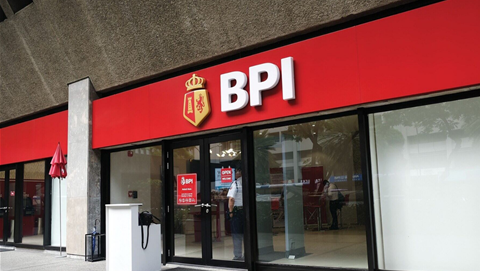
Philippines' BPI bank uses AI to improve customer digital experience

- Philippines
- South Korea
- The Maldives
- Appointments
- Trade Calendar
- News Archive
- Print Edition
Singapore maps 2040 tourism vision while keeping global trends in sight

Singapore’s tourism leadership has unveiled its vision for the industry across the next two decades while highlighting a global landscape fraught with intensive competition for the tourism dollar and challenges of a rapidly ageing world as well as business opportunities arising from Asia’s continued importance to the global economy and further technology advancement.
Singapore’s minister for sustainability and the environment and minister-in-charge of trade relations, Grace Fu, underlined three visions for Singapore as the country approaches 2040: a world class destination with diverse, unique and inspiring experiences for visitors; a vibrant and endearing home that Singaporeans and residents proudly advocate for; and a global hub of innovative and productive tourism enterprises, where companies and talents co-create sustainable tourism growth.
Reflecting on these visions, Fu said: “While 2040 may seem like some time away, the work starts today. Changi Airport’s Terminal 5 is expected to be operational around mid-2030s. URA is also reviewing the Master Plan for 2025 which will outline key developments and plans for the next 10 to 15 years.
“We need to act decisively today to capture future opportunities. For a start, we should start thinking about where we want to be collectively as one destination Singapore, and set plans in motion to develop our competitive advantages.”
To set the route towards Tourism 2040 objectives, Singapore Tourism Board (STB) will conduct a series of engagements and workshops with industry players, members of the public, and representatives from institutes of higher learning, with the intention of encouraging all to contribute to the conversation on the future of tourism.
Between now and then, Singapore’s tourism industry players will need to pay attention to “global trends and major shifts over the next decades that will impact our workers, our business and our industry”, as they leverage immediate opportunities to collectively “fend off the competition”, remarked STB’s chief executive Melissa Ow.
“The world is ageing rapidly,” she said, noting that the population of individuals aged 65 and above is estimated to double to more than 1.3 billion – and half of this demographic will reside in Asia.
“This phenomenon will be one of the greatest social, economic transformations of our time and will no doubt, impact consumption patterns, lifestyles, and of course, travels,” she said.
Ow also noted that Asia will remain as the engine of growth for the global economy, driven by the major economies of India, China and South-east Asia. This region will also lead the way for global wealth, thanks to the vibrant start-up scene and wealth creation of first-generation entrepreneurs and inter-generational wealth transfers
This could well spur business event activity in Singapore while growing affluence would fuel leisure travel and demand for experiences.
“At the same time, the quality of lifestyle experiences and tourism offerings in the home countries of our visitors and across many of our competitor destinations will become more compelling. There will be a premium on what is intrinsically unique and that which truly delivers quality and value,” she forecasted.
Pointing to a third trend to watch, Ow said technology advancements would accelerate in the next decade, potentially bringing about greater product innovations and productivity breakthroughs.
“The key question for us is, will Singapore continue to appeal and win over our visitors?
“Tourism 2040 is therefore a planning roadmap to identify and align our efforts around new growth areas for the sector as we embark on the next phase of our quality tourism journey,” Ow added.
While recognising the value of a yield-driven strategy, Ow said incremental growth in visitor numbers was just as “necessary to sustain a baseload demand for many of our tourism businesses”.
To achieve that volume, Singapore must grow its core visitor base that is made up of leisure, business and corporate event visitors.

Celebrate the art of Monet at Gardens by the Bay this July

A luxurious stay at the iconic Singapore Marriott Tang Plaza Hotel

Discover the beauty of Thailand with industry-leading properties from ONYX Hospitality Group

Is Your Business Listed On TTGmice Planner Online?
DidaTravel announces strong sales growth across GCC markets ahead of ATM
Positive outlook for Wyndham Hotels & Resorts buoyed by APAC growth

Advertise with us

Future of Tourism: Digital Travel APAC 2023 Innovation Brief
RELATED ARTICLES
Singapore tourism landscape continues transformation with new products, experiences, google, singapore tourism board to create ar experiences on google maps, four-party partnership to drive marketing efforts for singapore’s sentosa, singapore steps up investment in tourism human capital, expanded partnership to enhance charms of singapore’s marina bay precinct, singapore updates tourism performance forecast for 2024, rakuten travel steps up engagement with singaporeans, big concerts, big lessons: how hotels can win over music fans, singapore deepens investment into indonesian source market, tried and tested.

21 Carpenter

Fun for the family at Conrad Centennial Singapore
What to buy now.

New hotels: Shangri-La Nanshan, JEN Kunming by Shangri-La, Six Senses Kyoto...

- TTG Travel Awards
- Privacy Policy
- Terms of Use

All Rights Reserved
New Country Partnership Framework with Jordan Charts the Way
Story highlights.
- The World Bank and Jordan’s new Country Partnership Framework will support implementation of the country’s 10-year economic modernization plan
- The CPF will help to increase private sector jobs, especially for women and young people, green investments, and improve human capital outcomes
- Over the past 5 years, the World Bank’s active portfolio has increased from four to 17 projects totaling US$4.5 billion for education, water, energy, agriculture and jobs
The World Bank Group’s new Country Partnership Framework (CPF) with Jordan for 2024-2029, charts an ambitious path forward for creating opportunities for the people of Jordan. It places inclusive green growth at the center with a focus on: 1) More and better private sector jobs, especially for youth and women; 2) Improved human capital outcomes; and 3) Increased resilience and sustainability with green investments. The CPF underscores that none of these goals cannot be met without the full engagement and economic participation of women and youth.
These priorities reflect the aspirations of the Jordanian people. The CPF has been shaped by comprehensive consultations with diverse stakeholders across the country. It is fully aligned and will support Jordan to implement the country's 10-year Economic Modernization Vision and Public Sector Modernization Roadmap, which the government adopted in 2022 for the people of Jordan.
THE CPF is rooted in an understanding of Jordan’s diverse economic and development landscapes and built upon the foundation of long-standing partnership with the World Bank Group. Over the past 5 years, the World Bank’s active portfolio has increased from four to 17 projects reaching US$4.5 billion, spanning sectors including education, water, energy, agriculture and job creation. IFC investments in Jordan have doubled since 2010. For MIGA, Jordan is its most diversified and third-largest investment exposure in the region.
The 2024-2029 CPF takes our partnership to the next level. Ambitious plans include improving the business climate and attracting private investment in critical sectors like tourism, digital services, and green industries; supporting Jordan as a refugee host and on the country’s digitalization journey; revitalizing the education system and technical and vocational education to equip young people with diverse skills for future jobs; and building more resilience through investments to drive green energy and water security.
The CPF endorsement by the Board in April 2024 was accompanied by the approval of two new anchor operations that will support early implementation of the CPF. The Jordan People-Centric Digital Government Program for Results (PforR) , financed by a US$321 million loan and a US$29 million grant from the Global Concessional Financing Facility (GCFF), aims to enhance public service delivery and expedite digital transformation. The Enhancing Women's Economic Opportunities Operation , financed by a US$221 million loan and a US$5 million grant from the Early Learning Partnership’s Invest in Childcare Initiative, addresses key constraints to women joining and staying in the labor market.
Watch this video to learn more about the CPF and how the World Bank and Jordan are partnering to build a strong future for the people of Jordan.
This site uses cookies to optimize functionality and give you the best possible experience. If you continue to navigate this website beyond this page, cookies will be placed on your browser. To learn more about cookies, click here .

- Board Of Directors
- Organisation Chart
- Achieving Quality Tourism
- Legislation
- Corporate Governance
- Invest in Tourism
- ASEAN Economic Community
- Media Releases
- Corporate Publications
- Newsletters
- Statistics & Market Insights Overview
- Tourism Statistics
- Industries Overview
- Arts & Entertainment
- Attractions
- Dining & Retail
- Integrated Resorts
- Meetings, Incentives, Conventions & Exhibitions
- Tourist Guides
- Travel Agents
- Assistance and Licensing Overview
- Tourism Sustainability Programme (TSP)
- Singapore Visitor Centre (SVC) Network Partnership
- Grants Overview
- Licensing Overview
- Tax Incentives Overview
- Other Assistance & Resources Overview
- SG Stories Content Fund Season 2
- Marketing Partnership Programme
- SingapoReimagine Marketing Programme
- Singapore On-screen Fund
- Hotel Licensing Regulations
- Data College
- Trade Events and Activities
- Trade Events Overview
- SingapoReimagine Global Conversations
- SingapoRediscovers Vouchers
- Made With Passion
- Joint Promotion Opportunities
- Procurement Opportunities for STB's Overseas Regional Offices
- Product And Industry Updates
- Rental of F1 Pit Building
- Singapore Tourism Accelerator
- Sponsorship Opportunities
- STB Marketing College
- Tourism Innovation Challenge
- Harnessing Technology to Emerge Stronger Post COVID-19
- Tourism Transformation Index (TXI)
- New Tourism Development in Jurong Lake District
- International Trade Events
- Singapore Familiarization Trips
- EVA-Ready Programme
- Tourism Industry Conference
- Expo 2025 Sponsorship and Partnership Opportunities
- Virtual Influencer Open Call for Collaboration
- Students & Fresh Graduates
- Professionals
- Attractions Operator
- Business/Leisure Event Organiser
- Media Professional
- Tourist Guide
- Travel Agent
Singapore Tourism Board, TNG Digital and Alipay+ ink partnership to promote travel to Singapore
Malaysian users of Touch ‘n Go eWallet by TNG Digital to get more out of their holiday in Singapore through travel deals covering retail, attractions and dining
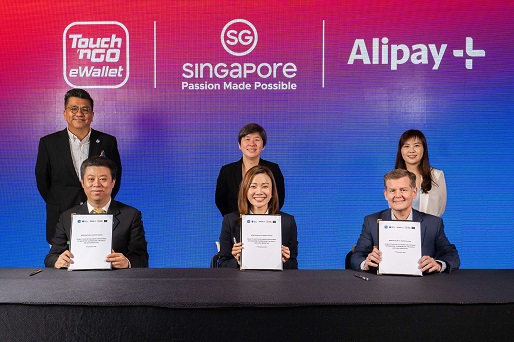
Malaysian visitors planning their next holiday in Singapore will soon enjoy a wide range of exciting deals following the partnership between Singapore Tourism Board (STB), TNG Digital and Alipay+. (Clockwise from top left) Mr. Danny Chua, Chief Commercial Officer of TNG Digital; Ms. Juliana Kua, Assistant Chief Executive of STB; Ms. Sophia Ng, Senior Marketing Manager of Ant Group; Mr. Douglas Feagin, Senior Vice President of Ant Group and Head of Alipay+, Ant International; Ms. Melissa Ow, Chief Executive of STB; and Mr. Alan Ni, Chief Executive Officer of TNG Digital at the MoU signing ceremony.
Kuala Lumpur, 15 November 2023 – Singapore Tourism Board (STB), TNG Digital, and Alipay+ have signed a memorandum of understanding (MoU) to offer visitors from Malaysia curated deals for their next holiday in Singapore. The partnership will not only introduce more cashless payment options to travellers, but also allow users access to a wide range of exciting promotions when in Singapore. Currently, there are about 10 in-destination promotions to be had in Singapore and more will be added in the coming months.
Malaysian users of Touch ‘n Go eWallet by TNG Digital now enjoy the convenience of using the eWallet for booking flights or purchasing travel insurance before their trips. Soon, they will be able to pay and redeem promotions via Touch ‘n Go eWallet by TNG Digital across more lifestyle merchants in Singapore such as retail stores, attractions and restaurants. Users can also expect to enjoy up to an 80% discount for transport and daily items. As a payment partner of the Alipay+ ecosystem, TNG Digital allows users from Malaysia to tap on their Touch ‘n Go eWallet to transact in Singapore, and enjoy additional benefits provided by Alipay+.
Singapore is seeing a steady rebound in international travel and tourism - between January to October 2023, the city-state recorded more than 11 million visitor arrivals globally. Malaysia is one of Singapore’s top 3 tourism source markets with more than 891,000 visitor arrivals between Jan-Oct this year.
Mr Terrence Voon, Executive Director, Southeast Asia, Singapore Tourism Board said: “Travellers in the post-pandemic world expect a seamless traveller experience enabled by contactless payments. Our timely collaboration with TNG Digital and Alipay+ taps into this trend, leveraging our partners’ strengths to promote Singapore as a destination of choice and encouraging travellers to get more out of their visit to Singapore.”
The partnership, which will be made available to all verified Touch ‘n Go eWallet users by TNG Digital in Malaysia, will cover co-investment in joint marketing campaigns, and entail collaborations to onboard more Singapore-based merchants to offer attractive tourist promotions.
Eager to embark on this partnership, Mr. Danny Chua, Chief Commercial Officer of TNG Digital , expressed, "Expanding payment and financial convenience to our users beyond Malaysia has always been one of our key objectives as the biggest leader in the digital wallet sector within the country. Currently serving over 21 million users, we have already connected them to more than 2 million merchant touch points in Malaysia. Our users now have additional incentives to spend, receive perks and earn GOrewards points with Touch 'n Go eWallet when they travel to Singapore."
Alipay+ will work with TNG Digital to continue promoting its A+ Rewards programme, a rewards platform within the eWallet. The partnership enables more Singapore stakeholders to tap into both TNG Digital and Alipay+ platforms to further showcase the destination’s myriad lifestyle offerings.
Douglas Feagin, Senior Vice President of Ant Group and Head of Alipay+, Ant International , said: “As more travellers return to Singapore, we’re excited to connect local businesses with international visitors digitally. Working closely with STB, we will enable Malaysian tourists to discover and visit more local merchants, to pay easily with their home e-wallet, TNG Digital, and enjoy greater savings. Through more enhanced digital payments, Singaporean merchants will also benefit from the rise in tourism.”
Malaysian users of Touch ‘n Go eWallet by TNG Digital can stay up-to-date on the upcoming deals and offerings available via the eWallet for their next holiday in Singapore by following Touch ‘n Go eWallet on Instagram and Facebook.
Please see media assets available for download here .
About Singapore Tourism Board The Singapore Tourism Board (STB) is the lead development agency for tourism, one of Singapore’s key economic sectors. Together with industry partners and the community, we shape a dynamic Singapore tourism landscape. We bring the Passion Made Possible brand to life by differentiating Singapore as a vibrant destination that inspires people to share and deepen their passions.
More: www.stb.gov.sg or www.visitsingapore.com
About TNG Digital Sdn Bhd
Established in 2017, TNG Digital is the operator of Touch ‘n Go eWallet, Malaysia’s largest and leading Fintech company, with more than 21 million registered users and over 2 million merchant touch points. Our full suite of financial services includes investments, lending and credit, remittances, insurances; support payments for over 1 million merchants in Malaysia, offer cross-border QR payments in popular destinations like mainland China, Japan, Singapore, South Korea, Thailand, and Indonesia, and facilitate international payments through our partnership with Visa. Our financial products drive financial inclusion through empowering users and merchants across physical and online payments infrastructure. For more information, please visit www.touchngo.com.my
About Alipay+ Alipay+ is a suite of cross-border digital payment, marketing and digitalization solutions that help connect global merchants to consumers. Consumers enjoy seamless payment and a broad choice of deals using their preferred payment methods while travelling abroad. Small and medium-sized businesses may use Alipay+ digital tools to enhance efficiency and achieve omni-channel growth.
About the Organisation
What industry does your organization fall within, what best describes the key intent of the project that your organisation is seeking funding for, is your organisation a singapore-registered legal entity, is your organisation an association, is the project able to achieve one or more of the following outcome.
- Increase no. of sailings to/from Singapore
- Increase no. of foreign cruise passengers to Singapore through sailings to/from Singapore
- Increase no. of pre/post nights for cruise passengers sailing to/from Singapore
- Increase capability of industry players via cruise-specific industry training programmes
- Strengthen the potential/ attractiveness of cruising in Singapore and/or Southeast Asia
Is the project able to achieve one or more of the following?
- Improve visitor satisfaction (especially foreign visitors)
- Increase footfall
- Increase revenue
- Significant branding and PR value
Is the project able to attract foreign visitors and contribute to foreign visitors' spend?
Who will be the main target audience of your project, is your project innovative and/or a new event in singapore with tourism potential, what best describes your project, does the event have proven track records in singapore or overseas, and/or growth in tourism value such as growing foreign visitorship, and/or enhancement of precinct vibrancy etc, does the project have a clear tourism focus (e.g. tourism-related trainings, tourism companies taking on capability development initiatives or technology companies creating technology products and services for the tourism businesses), what best describes your market feasibility study project.
Based on your selection, the following STB grant/s may be applicable for your project:
Please note that projects that have commenced prior to Singapore Tourism Board's offer may not be eligible for grant support. Examples where projects are deemed as having commenced include:
- Applicant has started work on the project e.g. tender has been called.
- Applicant has made payment(s) to any supplier, vendor or third party.
- Applicant has signed a contractual agreement with any supplier, vendor or third party.

IMAGES
COMMENTS
The Tourism (Attractions) IDP is jointly developed by the Singapore Tourism Board (STB) and IMDA, in consultation with the industry, as a guide for local attractions, including small and medium enterprises (SMEs), to uplift their digital capability as they embark on digital transformation efforts to drive growth.
In 2021, the Singapore Tourism Board (STB) launched the Tourism Technology Transformation Cube, or Tcube, a one-stop resource to help tourism businesses accelerate their digital transformation efforts. Through a structured three-step Learn-Test-Build framework, businesses can better understand what they need to thrive in today's tech-focused ...
The Tourism (Attractions) IDP is jointly developed by the Singapore Tourism Board (STB) and IMDA, in consultation with the industry, as a guide for local attractions, including small and medium enterprises (SMEs), to uplift their digital capability as they embark on digital transformation efforts to drive growth.
About Tcube. Tcube, or the Tourism Technology Transformation Cube, is an innovation platform and initiative by the Singapore Tourism Board (STB) that provides thought-leadership resources, digital initiatives, and programmes to support the tourism sector's digital transformation journey. Through Tcube, STB aims to groom transformational leaders ...
The Singapore Tourism Board has unveiled Tcube, an innovative space at Tourism Court that aims to help tourism stakeholders better their digital capabilities to reimagine visitor experiences and achieve sustainable operations. On the reason for launching Tcube, or the Tourism Technology Transformation Cube, Ong Huey Hong, executive director ...
The Singapore Tourism Board (STB) is the leading economic development agency for Singapore's tourism industry. Seeking to differentiate Singapore as a tourism destination, STB oversees all aspects of tourism in the city-state, including resource allocation and strategic planning. ... As part of their digital transformation, Copthorne King's ...
Mr Tan said the tourism board will continue to work with partner agencies to attract companies with technology and digital solutions that are relevant for Singapore's tourism sector.
As such, the tourism sector needs to evolve to meet these changing expectations. Recognising the needs of tourism businesses, the Singapore Tourism Board launched Tcube in 2021 to support end-to-end digital transformation of the sector. Tcube, or the Tourism Technology Transformation Cube, is an all-in-one platform for tourism businesses ...
Singapore's tourism industry will receive further training and business development funding, as well as digital transformation support from the government, as it continues on its road to recovery. The Tourism Development Fund (TDF) will get a S$68.5 million (US$51.1 million) injection and extended support levels for the Business Improvement ...
The Singapore Tourism Board has developed a digital pass and an analytics service, among other initiatives, to digitalise the city-state's embattled tourism industry. With steep declines in ...
Visit Tcube for STB's initiatives and resources to support your business' digital transformation. Learning Resource: STB Marketing College. ... Google and Singapore Tourism Board to bring location-based AR experiences to Google Maps for the first time. DISCOVER SENTOSA ANEW THROUGH THE PARTNERSHIP OF ICONIC BRANDS. Porsche announces the ...
Recognising that digital transformation is the way forward, the Singapore Tourism Board (STB) introduced initiatives such as Tcube, a hybrid innovation space that brings digital initiatives, resources, and thought leadership content onto a single platform. In addition, we have the Tourism Accelerator Programme that supports companies in ...
The IDP includes advice on how Singapore attractions companies can overcome challenges in the industry as they pursue digital transformation to enhance processes and improve operational efficiencies to deliver better customer experience. The Tourism (Attractions) IDP was jointly developed by Infocomm Media Develop Authority (IMDA) and the ...
Aug 23, 2021. |. Wong Ming Fai, Chief Technology Officer at STB, urges tourism businesses to tap technology and open new revenue streams. Technology has been Singapore Tourism Board's (STB) key rallying call for the travel industry to embark on digital transformation in recent years, an effort that was further intensified since the pandemic.
Tools to accelerate digital transformation . COVID-19 is changing consumer behaviour and will have a lasting impact on travel. To build resilience, STB has developed a set of tools to accelerate the tourism sector's digital transformation: ... The Singapore Tourism Board will open the ThreeHouse, a dedicated innovation space located on STB ...
Singapore Tourism Board (STB), the Singaporean destination marketing organisation, launched a medium-term marketing strategy (2016- 2020) in order to tackle the increasingly complex tourism landscape and to stay ahead of the competition. Singapore's marketing strategy aims at inspiring consumers before and after their arrival at the destination.
As global tourism numbers plummet, STB looks to technology to help transform the industry. DBS Bank and the Singapore Tourism Board (STB) have partnered to use digital technology to stimulate domestic tourism demand in the immediate term, as well as drive cross-border demand and catalyse tourism industry development in the mid- to long-term.
Tcube is hosting a digital event for tourism businesses on building a cohesive digital transformation strategy, happening on 22 Feb 2022, 4 - 5pm. We will dive into the topic of digital transformation strategy and explore the different aspects of culture, innovation, data, and leadership required to successfully transform a tourism business.
By Kumar Gandharv on May 12, 2023 9:00AM. Singapore Tourism Board's chief technology officer, Wong Ming Fai, said in a LinkedIn post that the board has partnered with Google's ARCore team to co-create digital tourism experiences. Wang was responding to a post by Google's APAC Travel team lead, Hermione Joye, who wrote that STB is the ...
Director, Digital Transformation Singapore Tourism Board 1. A vibrant and inspiring Destination Singapore that we ... To champion place management of Singapore's tourism precincts to deliver authentic and sustainable destination experiences To execute major projects such as F1, development of ...
Tourism-related businesses have been prompted to pivot their business models, create new product offerings and target new customer segments as a means of survival, but there continue to be barriers to adoption for digital transformation. To help tourism businesses navigate these challenges, the Singapore Tourism Board (STB) launched the Tourism ...
Singapore Tourism Board invites public and private sectors to contribute ideas towards achieving Tourism 2040 goals. Reflecting on these visions, Fu said: "While 2040 may seem like some time away, the work starts today. Changi Airport's Terminal 5 is expected to be operational around mid-2030s. URA is also reviewing the Master Plan for 2025 ...
The Tourism Transformation Index is a self-assessment tool that was developed specifically for the tourism sector. It is designed to guide Singapore tourism organisations regardless of size and industries to future proof businesses by providing a holistic diagnosis of the current state of transformation, information about where the business stand among industry peers and recommendations to ...
The World Bank Group's new Country Partnership Framework (CPF) with Jordan for 2024-2029, charts an ambitious path forward for creating opportunities for the people of Jordan. It places inclusive green growth at the center with a focus on: 1) More and better private sector jobs, especially for youth and women; 2) Improved human capital outcomes; and 3) Increased resilience and sustainability ...
Kuala Lumpur, 15 November 2023 - Singapore Tourism Board (STB), TNG Digital, and Alipay+ have signed a memorandum of understanding (MoU) to offer visitors from Malaysia curated deals for their next holiday in Singapore. The partnership will not only introduce more cashless payment options to travellers, but also allow users access to a wide range of exciting promotions when in Singapore.